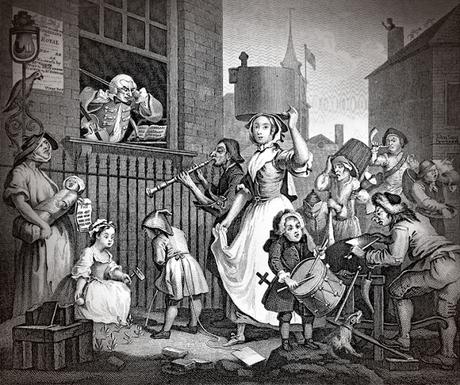by Paul J. Pelkonen

The Enraged Musician. Engraving by William Hogarth from 1741,
the year of the premiere of Handel's Messiah.
Things have changed recently at St. Thomas, the ornate Episcopalian church that squats on Fifth Avenue amid the commerce and chaos of the holiday season. The choir has a new music director, Daniel Hyde, and concertgoers were eager to hear this British conductor bring some warmth and understanding to this beloved and familiar work. Mr. Hyde led a measured performance that brought out the rich textures of this score and led the scarlet-robed choral singers in the three act, three-hour work.
With Messiah, the ever-enterprising Handel broke most of the rules that govern the performance of oratorio, that peculiar hybrid of sung drama that was developed so that stories from the Bible could be sung and performed without all the messy and "blasphemous" trappings of sets, costume and makeup. And unlike most oratorios, which rely on stories from the Old Testament and tell these tales in a linear fashion, the text of Messiah is elliptical, a series of contemplations on the meaning of the life of Jesus rather than a retelling of the Gospels.
Handel and his librettist Charles Jennens took a freewheeling approach to telling the story of Jesus, cherry-picking useful bits from the pages of the King James Bible. Prophecies of the coming of a savior open the work, drawn from the Book of Isiah. The Gospels themselves are tapped for the stories of Christ's birth and works, and elements of the Passion are drawn vividly in the orchestration of "He was despised." The Book of Revelation is the source of the work's most famous moment, the "Hallelujah" Chorus."
The soloists were somewhat variable. Soprano Ellie Dehn brought genuine warmth and power to her parts, including the work's climactic aria. However, Clare McNamara's small-shouldered mezzo disappeared when placed against the backdrop of the orchestra. Her voice is pretty enough but was swallowed up and at times, inaudible. These problems were only slightly relieved by Mr. Hyde, but this instrument did not impress even when heard by itself. Matters came to a head with "He was despised", the crucial depiction of Christ's suffering that anchors the second act of Messiah.
Tenor Lawrence Jones showed a lyric, operatic instrument in Handel's ornamental writing, adding flourishes and curlicues with the intensity and focus of an ornamental wood-carver. The finest of the four soloists was the veteran Jesse Blumberg. He sang "The Trumpet Will Sound" with orotund tone, accompanied by natural trumpets that struggled at times to stay in tune with the rest of the orchestra.
Despite the problems with the soloists, this still remained a forceful and convincing retelling of the Messiah. This is thanks to the hard work of Mr. Hyde and his expert preparation of the Saint Thomas Choir of Men and Boys. Their strength was shown in the work's most elaborate fugal passages, the descending, elaborate figurations that the composer uses to display faith and wonder at the mystery of the events within the work.

